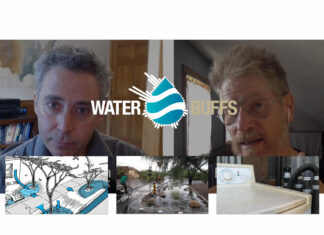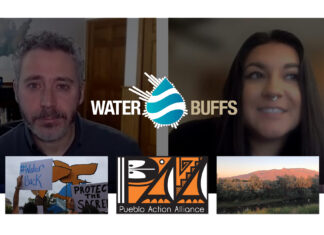On this episode of Water Buffs, we examine how drought can harm human health, specifically how dramatic fluctuations in water availability can lead to increasingly toxic water supplies.
Dr. James is an award-winning epidemiologist and engineer specializing in environmental and climate risk factors and their connection to health in vulnerable populations. She is an associate professor at the University of Colorado Anschutz Medical Campus, one of three institutions that make up the Colorado School of Public Health.
She recently spoke to journalist Melissa Bailey for a Water Desk-supported article, “Once ‘paradise,’ parched Colorado valley grapples with arsenic in water.” The article, originally published by KFF Health News, centered around Dr. James’ community-based research projects that investigate exposure to heavy metals, in particular a rise in carcinogenic arsenic in drinking water in Colorado’s drought-stricken San Luis Valley.
Episode highlights Click links to cue video
 | Kathy James, PhD, MSPH, MSCE Dr. James is an epidemiologist and engineer at the Colorado School of Public Health who specializes in environmental and climate risk factors and health in vulnerable populations. Starts at 1:05 |
| Effects of drought on water quality Recent research looked at drought conditions in Colorado’s San Luis Valley and how reduced water supply might result in a greater concentration of metals and contaminents in local wells. Starts at 2:03 | |
| Study findings A recent KFF Health News story supported by the Water Desk explored research by Dr, James finding that drought conditions have been intensifying the levels of metals in drinking water in southwestern Colorado. Starts at 4:38 | |
| Does reduced water quantity always mean more pollution? (7:04) | |
| Why the San Luis Valley? The area is one of the oldest agricultural communities in the state, with residents going back as many as eight or nine generations. It is the highest mountain plain desert in the western hemisphere and is a leading producer of potatoes, lettuce and alfalfa. It also experienced a megadrought from 2002 to 2012. Starts at 10:47 | |
| Are metals in water a concern for crops and livestock? There is less concern regarding metals appearing in meat and produce than in water consumed directly from contaminated wells. Starts at 16:13 | |
| What are the health consequences of water contamination? Arsenic contamination can lead to a number of health problems from heart, kidney and reproductive concerns to cognitive developmental problems. Starts at 19:44 | |
 | Water Words: “Hard Water” The “hardness” of water can be traced to its level of dissolved calcium and magnesium. Hard water can be harmful to piping and household appliances but can be beneficial to ecosystems. Starts at 25:31 |
| Thoughts on media imagery of drought Do representations of water scarcity seem too apocalyptic? Starts at 28:49 | |
| How can people keep healthy and safe? With research partners at ASU, Dr. James is exploring low-cost and environmentally low-impact filtration systems for removing harmful substances from well water. Starts at 36:07 | |
| Is well testing too expensive? Currently, private well owners are responsible for the cost of testing. More important, says Dr. James, is helping them address problems that the tests find. Starts at 40:00 | |
| Are water quality concerns affecting mental health as well? (44:49) | |
| Should governments mandate more testing? (48:13) | |
| Show more episode detail | |
Watch or listen wherever you get your podcasts
You’re welcome to watch the video version of Water Buffs here on our website or subscribe to it on our YouTube and Vimeo Channels. If you prefer your podcasts on audio or on a portable device, subscribe using one of the services below or grab the feed url for your own service.
Ways to get the audio version: Apple Podcasts | Spotify | Google Podcasts | Soundcloud | Stitcher | Podcast RSS Feed
Share your thoughts – and consider joining us
If you’re interested in appearing on the show, please contact Water Desk Director Mitch Tobin at mitchtobin@colorado.edu. If you’d like to share your comments and questions, you can reach us at waterdesk@colorado.edu, or on Twitter and Facebook.
Podcast article css and js





